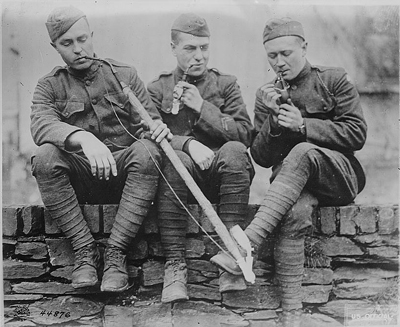Fighting Words: Canadian Soldiers’ Slang and Swearing in the Great War, a brilliant essay by Tim Cook, is probably the best example of swearing and slang used during wartime to create a sense of belonging for soldiers. It was very important for the fresh faces for learn the slang and use it just like the other soldiers, although some of them would have never used swear words before joining the war and most likely would have avoided the use of strongly taboo terms, especially the ones they learnt while on duty.
It seemed quite difficult to detect the swear words at soldiers during the First World War as there is very little documentation you could extract this kind of information from. However, it is well known that certain words used by soldiers were at that time considered both shocking and reflecting a lower social class. ‘Bloody’, for example, was considered as a ‘lower-class’ word, The British Library reports.
Another good example is the word ‘bloke’, which at the moment would not be considered a swear word, although in 1914 it was associated to quite a few different things, including an officer, a ‘quarter-bloke’ or a quartermaster-sergeant, while in the Navy, ‘the Bloke’ was slang for the captain.
Self-censorship in documentation was used by Private Albert Andrews in one of his accounts of an encounter on January 28, 1916, when he said – ‘Look at this ––er … he thinks he’s going to Blighty.’
Casual and deliberate swearing, including ‘*******’ and ‘bloody’, where the expression ‘get your ******* rifles’ was viewed as considerably less urgent than the expression ‘get your rifles’. For most of the servicemen coming from middle-class families, this kind of behavior and speaking was shocking and it sometimes made them want to isolate. One of them was Donald McNair, who simply could not hear anymore swear words used in conversations by his comrades – ‘utterly low-class and foul-mouthed louts – I certainly have nothing in common with them, and find it difficult to put up with their wantonly pointless, witless and filthy conversation.’
It wasn’t always permitted to swear, in fact, the army knew exactly whether it was deliberately offensive swearing or ‘occupational swearing’. Some documents show that if soldiers were caught swearing for no reason, they were punished. Among those who suffered from using swear words without needing to, was Private Alfred Smith, of the West Yorkshire Regiment, who received a fine of seven shillings and six pence, plus three days confined to barracks for showing off drunk and for using ‘highly obscene language.’
